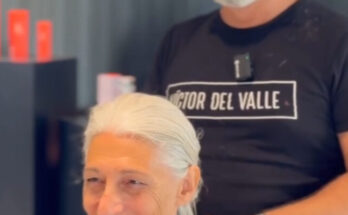In a moment that has since gone viral and sparked a nationwide discussion, Marine veteran and motivational speaker Johnny Joey Jones found himself in an unexpected exchange with television host Joy Behar.
What began as a tense dismissal from Behar turned into a defining moment that highlighted the pride, sacrifice, and resilience of America’s service members.
The incident unfolded during a live taping in New York, where Jones had been invited to speak about the challenges veterans face when returning to civilian life.
Known for his candor and ability to connect with audiences, Jones was sharing his journey of recovery after losing both legs in Afghanistan.
His message was clear: service members often carry invisible wounds long after their tours of duty end.
But the atmosphere shifted abruptly when Behar interjected.
With a wave of her hand, she reportedly remarked, “You’re just a soldier.”
For a brief moment, silence filled the studio. Audience members shifted uncomfortably, unsure of how Jones would respond.
The words hung in the air, carrying a weight that many veterans know all too well — the misunderstanding of their service and the underestimation of their sacrifice.
Jones did not flinch. Instead, he leaned forward slightly, his voice steady and calm.
With a measured pause, he delivered seven words that cut through the silence like a knife:
“A soldier’s worth is measured by sacrifice.”
The audience erupted into thunderous applause.
Some stood on their feet, clapping and cheering, moved by the raw truth of his words.
Behar, usually quick with a rebuttal, sat speechless. Cameras captured her stunned expression as she struggled to respond.
A Moment of Truth
For Jones, the exchange was not about confrontation but about clarity. “It wasn’t anger,” he explained in a later interview.
“It was about respect — for every man and woman who has worn the uniform.
Being ‘just a soldier’ is an honor in itself, because soldiers carry the weight of freedom on their shoulders.”
His response has since been shared widely across social media platforms, with many veterans and their families praising him for speaking on behalf of the military community.
The clip has been viewed millions of times, sparking conversations about how America values its service members.
The Weight of Sacrifice
Jones’s words carry particular power because they stem from lived experience.
At just 24 years old, he was serving as a Marine bomb technician in Afghanistan.
After days of identifying and defusing improvised explosive devices, a single step changed his life forever.
An explosion claimed both of his legs and severely injured his right arm.
But rather than retreat into despair, Jones rebuilt his life.
He became a public voice for veterans, using his platform to advocate for mental health resources, better healthcare access, and the recognition that military service is not defined by rank or title but by sacrifice.
“The day I was injured,” Jones once said, “I thought my life was over.
But what I’ve learned is that true strength isn’t in the body, it’s in the heart.
And that’s what I try to share with others.”
Public Reaction
Following the exchange, public reaction was swift.
Viewers took to Twitter, Facebook, and Instagram, with thousands echoing Jones’s seven words: “A soldier’s worth is measured by sacrifice.”
Many veterans’ organizations also released statements commending him for his dignity in the face of dismissal.
One viral comment read: “Joy tried to belittle him. Instead, he reminded the world what honor really means.”
Another wrote: “Those seven words should be on every memorial.”
Meanwhile, critics argued that Behar’s remark was insensitive and disrespectful.
Some called for an on-air apology, while others defended her, suggesting the moment had been misunderstood.
Regardless, the overwhelming response favored Jones, with his words resonating far beyond the studio walls.
A Voice for Veterans
Jones has long said that his mission is not about politics but about people.
“I’m not here to win debates,” he told reporters after the taping.
“I’m here to make sure the voices of my brothers and sisters in uniform are heard.
If I can remind America of the price of freedom, then I’ve done my job.”
His message is one of resilience and gratitude, qualities that shine through in his television appearances, podcasts, and speeches across the country.
He often emphasizes that while his body bears the scars of war, his spirit remains unbroken.
The Lasting Impact
The seven words he spoke that day — “A soldier’s worth is measured by sacrifice” — may well become a defining quote of his career.
They encapsulate not only his personal philosophy but also a universal truth about the military experience.
For many, it was a reminder that soldiers are not “just” anything.
They are sons and daughters, husbands and wives, fathers and mothers. They are ordinary people who make extraordinary sacrifices.
As the applause in that studio proved, Johnny Joey Jones did not need to raise his voice or deliver a lecture.
In just seven words, he silenced doubt, defended the dignity of his fellow service members, and left an indelible mark on everyone who heard him.

Daytime television is no stranger to drama, but rarely does it experience a moment so raw and unexpected that it halts the entire studio in its tracks.
That’s exactly what happened this week when tennis star Coco Gauff found herself the subject of a blunt remark from actress and talk show host Whoopi Goldberg.
The exchange, brief but unforgettable, has since become one of the most replayed clips on social media, sparking conversations far beyond the world of sports or entertainment.
It began with a sentence that seemed almost casual, yet carried an unmistakable sting: “She’s just a tennis player.”
Those were the words Whoopi Goldberg chose during a live broadcast, a dismissal that attempted to reduce Gauff’s presence to a single dimension.
For a 20-year-old athlete who has already been celebrated as one of the brightest rising stars in tennis, the remark immediately struck a chord with viewers.
The studio itself seemed to shift, as if everyone in the room recognized that something more than light commentary had just landed.
At first, Coco Gauff didn’t react. She simply nodded, inhaled deeply, and allowed the silence to stretch.
The cameras kept rolling, capturing every second of anticipation.
The audience could feel the tension build as Goldberg pressed on, expecting perhaps a laugh, a shrug, or some verbal sparring.
Instead, what followed was something entirely different.

Gauff raised her head. She placed both hands firmly on the table in front of her.
And then, she delivered seven words—calmly, directly, and without raising her voice.
Those words, which producers have so far chosen not to air in replay clips without context, carried an unexpected weight.
The effect on the room was immediate. Guests seated at the table dropped their gaze.
Someone backstage let out a shaky exhale that could be heard faintly on the microphones.
And Whoopi Goldberg, known for her sharp wit and seasoned ability to navigate tense on-air exchanges, froze.
For the first time in more than a decade of daytime broadcasting, she was left speechless. A single blink.
Then silence.
What happened in those seconds has been described by media analysts as a “television earthquake.”
It wasn’t loud, nor was it combative.
It was the quiet power of a young woman refusing to be defined by a label that diminished her.
For years, Gauff has been praised for her athleticism, discipline, and poise under pressure, but this moment showed something more.
It revealed the clarity of someone who understands that her voice carries as much force as her forehand.
Within hours, clips of the encounter began circulating online.
Social media platforms lit up as fans and commentators dissected every frame.
The clip wasn’t just trending among tennis enthusiasts.
It was being shared by political commentators, cultural critics, and everyday viewers who saw in Gauff’s calm defiance a broader statement about identity, recognition, and respect.
“Not out of anger,” one user wrote in a viral post, “but out of truth.”
Another observed that Gauff’s seven words “did what no one in ten years of daytime television ever managed: they shut the room down completely.”

Commentators have noted that the moment resonated because it wasn’t about confrontation—it was about correction.
In choosing her words so carefully, Gauff did more than respond to Goldberg.
She held up a mirror to the assumptions and biases often embedded in how public figures are discussed on mainstream platforms.
For decades, athletes—particularly women and women of color—have been boxed into categories that deny their complexity.
Gauff, in that brief exchange, reminded the world that she is not just a player, not just a competitor, but a voice worth listening to.
Goldberg’s silence has also been a focal point of discussion.
Known for her ability to steer heated debates and deliver quick rebuttals, her lack of response underscored the gravity of the moment.
Some analysts have even suggested that this may be remembered as a turning point in daytime talk history—a reminder that authenticity, even uncomfortable, has the power to cut through layers of media polish.
In the days since, the clip has continued to spread, fueling speculation about what Gauff’s exact words were and why they resonated so deeply.
While many fans argue that the words themselves are less important than the impact they had, others remain eager to know exactly what was said.
Media outlets have promised full transcripts in the coming days, but for now, the mystery remains part of the moment’s allure.
What is certain, however, is that this exchange has elevated Gauff’s presence beyond tennis.
She is no longer simply celebrated for her athletic achievements but now recognized as someone willing to stand firmly in her identity.
Her composure, timing, and ability to shift the narrative with only a few words have drawn admiration from unexpected corners.
As one commentator put it: “This wasn’t about winning an argument. It was about reclaiming a narrative.”
For Coco Gauff, that narrative is still unfolding.
But one thing is clear: she is far more than “just a tennis player.”
And for Whoopi Goldberg, the silence that followed may go down as one of the most unforgettable pauses in live television history.







